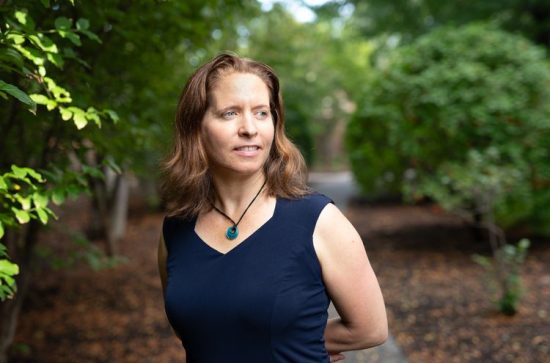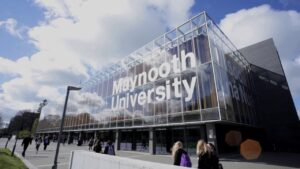- English
- DEUTSCH
- SPANISH
- FRENCH



With an academic career spanning more than 30 years, Professor Jennie Stephens is Professor of Climate Justice at the ICARUS Climate Research Centre at the National University of Ireland Maynooth. Born in Ireland, Jennie has spent much of her life and career in the US, so her current position is somewhat of a homecoming. We sat down with Jennie to learn more about her work on gender and climate change, and her experiences of a changing workplace.

… Jennie initially started down a more technical scientific route. “But I became increasingly aware,” she reflected, “that a lot of scientists don’t speak up on policy and aren’t actually advocating for or getting involved in the transformative changes that are urgently needed. I realised I wanted to shift my focus and do work with a bigger, more direct influence on society and social justice. Different opportunities have emerged in the science–technology–policy space that links the climate crisis to worsening economic injustices.”
This broadening of focus and connecting of dots brought with it another epiphany. “I realised how the mainstream approach to climate change is very male dominated, technocratic, patriarchal, and kind of controlling – many so-called “climate solutions” are based on the idea that humans have control over nature, and that we can develop technologies to fix the climate. I started realising that this way of thinking would never be transformative enough – and it actually reinforces the status quo. So I am an advocate of alternative approaches that are based on human rights and social justice. We need diversity of thought and diversity of perspectives and skills in order to become more transformative in our thinking and in our policies. So that’s where the feminist lens came into my work – based on my own experiences, really.”

… however, with some established colleagues questioning the utility of this approach. The very same power dynamics and structural disadvantages at the heart of Jennie’s academic work were also at play in the environment in which she was operating. “There was a time when I was doing a lot of energy technology research, and I attended big conferences with probably 95% men in the room. A lot of panels at these conferences were also all men speaking and presenting.”




Nevertheless, some of the connections made with other women in the room proved particularly fruitful. Over lunch at one such conference, Jennie recalls that she and a small group of other women attending started discussing different research ideas, leading to collaborative research proposals with a more social and equity justice focused approach, which went on to receive funding. “That all emerged,” Jennie reflected “because we connected in a different way in a very male dominated space.”
Jennie is a big believer in the power of networking and puts a lot of the success of her early career down to making connections with other people in her field. “I’ve always been quite collaborative in my work. I meet a lot of people and learn different things from different people I meet. Early on, I realised the value and opportunities of collaborating with people with different backgrounds, disciplines and experiences.”
… Jennie has recently published a new book Climate Justice and the University: Shaping a Hopeful Future for All (Johns Hopkins University Press, 2024). The ideas in this book are based on her own experiences of working on climate justice and energy justice in higher education for over 30 years – mostly in the US. Her 2020 book: Diversifying Power: Why We Need Feminist, Antiracist Leadership in Climate and Energy made the case for the need for diversity in thinking about climate and energy policy. Now in her current role at Maynooth, Jennie is keen to remain at the cutting edge of her field – critiquing the status quo and imagining alternatives – and pointed to the Spring Meeting of the Climate Justice Universities Union, ‘Building Collective Power for Feminist Climate Justice in Higher Education’, held in March as a particular highlight. She is also excited about continuing to advance the idea that higher education institutions are more than just places where individuals go to get a degree for career purposes. They’re also “central to legitimising different policy discourses and should also be thought of as critical social infrastructure providing support and resources for all during this increasingly disruptive time.” Jennie sees real potency in this idea in the context of our rapidly changing world.
When asked what advice she would have for those starting their career in the climate justice and the environmental policy space, Jennie said that she would encourage people to follow their interests and what they are passionate about. “Don’t try to follow the path of others. It’s a really dynamic time. Things are changing quickly in the world. Different kinds of leadership, different kind of skills, different kinds of networks are going to be important. I think there’s more new opportunities and pathways than anyone assumes.” While for some a career might be linear, that’s not the case for many people “You have to be able to respond to the time and opportunities in front of you,” Jennie counsels.
Thank you, Jennie, for your time and reflections. We very much look forward to seeing where your important work continues to take you.
Michelle is a Managing Partner.
Michelle works in Perrett Laver’s Dublin office. She is a Partner, former Head of the Project Management team and has worked across a number of Perrett Laver’s global Offices including London, Chicago and Hong Kong. She works with organisations across our Global Higher Education, Sport, Social Impact and Health sectors.